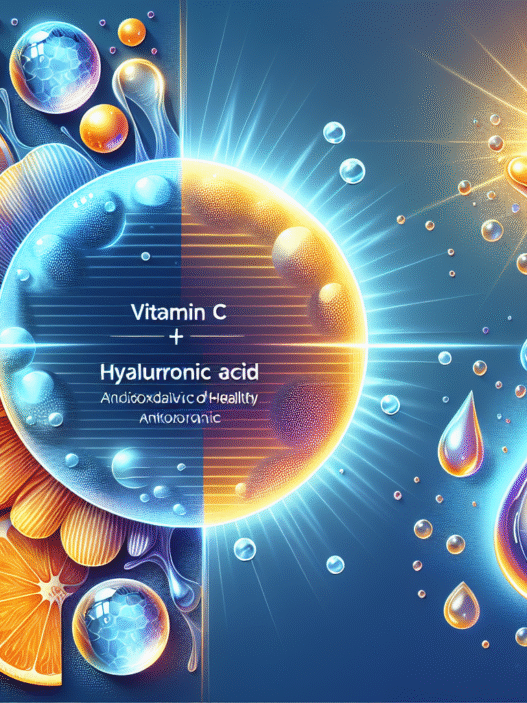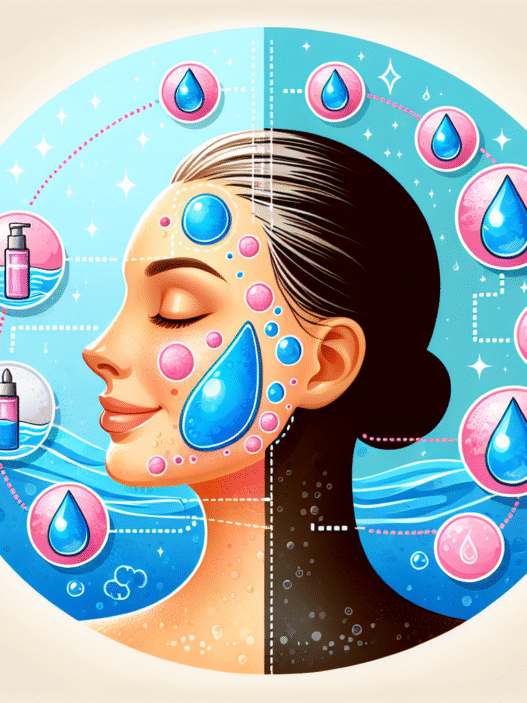Importance of Hyaluronic Acid
Hyaluronic acid plays a vital role in maintaining skin health and elasticity. Its various benefits make it a coveted ingredient among beauty and skincare enthusiasts.
Skin Health Benefits
Hyaluronic acid is essential for improving overall skin health. It enhances skin flexibility and elasticity, making the skin softer and more supple. Studies have shown that long-term use of hyaluronic acid serum, either topically or as an oral supplement, can lead to significant improvements in skin condition. Key benefits include:
- Moisture Retention: Hyaluronic acid increases the moisture content in the skin, which can help reduce the appearance of wrinkles and improve wound healing (Healthline).
- Anti-Aging Effects: Topical application leads to plumping, smoothing, and firming of the skin and reducing fine lines and wrinkles (Perricone MD).
- Acne Treatment Support: While hyaluronic acid is widely used in fillers for repairing or concealing acne scars, further research is needed on its effectiveness when combined with other medications for acne treatment (Cleveland Clinic).
Role in Elasticity
One of the standout features of hyaluronic acid is its remarkable ability to retain water. It can hold about one and a half gallons of water per quarter-teaspoon, making it a powerful moisturizing agent. This property is crucial for maintaining skin elasticity. Key points on its role in elasticity include:
- Water Absorption: Hyaluronic acid’s chain-like structure allows it to attach to cells and transport moisture throughout the body, enhancing skin texture and flexibility (Cleveland Clinic).
- Concentration Matters: The effectiveness of hyaluronic acid is influenced by its molecular weight and concentration in various formulations. Different products may serve specific purposes, such as hydration and pro-aging support.
- Complex Formulations: The Hyaluronic 4 + 2 Complex found in some products features multiple forms and natural building blocks of hyaluronic acid, making it capable of providing both instant and long-lasting hydration benefits (Perricone MD).
Hyaluronic acid is a powerful ingredient in enhancing skin health and maintaining elasticity. Understanding its implications can help individuals make informed choices about their skincare routines. For more information on how hyaluronic acid interacts with other compounds, check our guide on what not to mix with hyaluronic acid?.
Using Hyaluronic Acid
Hyaluronic acid has gained popularity in the beauty and skincare industry due to its impressive hydrating properties and potential benefits for skin health. There are two primary categories of hyaluronic acid applications: over-the-counter options and prescribed formulations.
Over-the-Counter Options
Over-the-counter (OTC) hyaluronic acid products are widely available and include a variety of formulations such as serums, creams, lotions, and eye care products. These topical products are considered safe for use on the skin and around the eyes (Cleveland Clinic). Many skincare enthusiasts incorporate these products into their routine to benefit from the hydrating and plumping effects that hyaluronic acid provides.
OTC products can also include oral supplements containing hyaluronic acid. These supplements claim to support skin hydration and improve overall skin condition. Consumers should expect to see varying results, and it’s advisable to consult with a healthcare provider prior to starting any new supplement routine.
| Product Type | Example Uses |
|---|---|
| Serums | Intensive hydration, layering under moisturizer |
| Creams | Long-lasting moisture, suitable for dry skin types |
| Lotions | Lightweight hydration, ideal for daily use |
| Eye Care | Reducing puffiness and smoothing fine lines |
Prescribed Applications
Prescribed hyaluronic acid products are generally reserved for specific medical conditions and should only be used under the guidance of a qualified healthcare provider. This includes injections that contain hyaluronic acid, which are commonly utilized in aesthetic procedures such as dermal fillers to repair or conceal acne scars. However, scientific evidence regarding effectiveness in acne treatment is limited when combined with other therapies (Cleveland Clinic).
Additionally, hyaluronic acid injections are FDA-approved for alleviating knee pain in individuals suffering from mild to moderate osteoarthritis when other treatment options have not yielded satisfactory results. According to a 2022 review of 38 studies, these injections are generally safe, although some patients may experience temporary local swelling and pain afterward.
Patients interested in injectable hyaluronic acid must consult with a licensed medical professional to avoid complications and ensure proper administration.
For further exploration of hyaluronic acid in cosmetics, consider examining if dermatologists recommend hyaluronic acid in your skincare regimen. Understanding the different applications and potential outcomes will inform beauty enthusiasts about what does hyaluronic acid do to your skin? and how to optimize its efficacy in their personal skincare routines.
Research and Discoveries
Ongoing Studies
Research into hyaluronic acid is continuously evolving, and scientists are exploring its various beneficial uses. Current ongoing studies focus predominantly on skin, joint, and eye health. According to the Cleveland Clinic, the molecule is being investigated for its versatility in the medical field. As researchers delve deeper into its mechanisms, they uncover new insights related to tissue repair, immune response, and hydration.
One particular area of interest is the synthesis of hyaluronic acid, which occurs through specific enzymes known as HA synthases (HAS) -1, -2, and -3. These enzymes extrude chains of hyaluronic acid into the extracellular space, essential for maintaining hydrated and healthy tissue. The skin itself contains about one-third of the body’s total hyaluronic acid, highlighting its vital role in hydration and appearance.
Promising Applications
Hyaluronic acid’s ability to attract and retain water—holding about one and a half gallons per quarter-teaspoon—makes it an excellent polymer for hydrating products. Its capacity to bind to water molecules contributes to skin health, keeping it moisturized and supple. However, as an individual ages, the levels of hyaluronic acid in the skin decrease, leading to dryness and the formation of wrinkles.
Beyond skincare, ongoing trials are examining hyaluronic acid’s potential in treatments for joint pain and ocular health. Through these studies, experts are uncovering further applications that could enhance quality of life for individuals dealing with conditions stemming from age-related hyaluronic acid depletion.
For those concerned about the effects of hyaluronic acid on their skin, questions such as what does hyaluronic acid do to your skin? and inquiries related to its interaction with other compounds are actively being addressed. As knowledge grows, so does the credibility of hyaluronic acid as a multifunctional ingredient in tackling various skincare challenges.
Hyaluronic Acid in Skincare
Hyaluronic acid plays a crucial role in the skincare industry due to its remarkable hydrating properties. Beauty and skincare enthusiasts often seek out products containing this ingredient to reap its multiple benefits.
Key Function in Products
Hyaluronic acid is known for its ability to hold up to 1,000 times its weight in water, making it an exceptional hydrator. This characteristic allows it to draw moisture into the skin, enhancing hydration levels and maintaining a plump appearance. Products containing hyaluronic acid can vary significantly in concentration and molecular weight, each serving different functions within a skincare routine.
| Product Type | Key Function |
|---|---|
| Serums | Deep hydration, improved elasticity, and wrinkle reduction |
| Creams/Lotions | Long-lasting moisture retention |
| Eye Care Products | Targeted hydration for the delicate eye area |
| Supplements | Internal support for skin hydration and joint health |
Over-the-counter options including serums, creams, and lotions are widely available, and these are deemed safe for topical application on the skin and eyes (Cleveland Clinic). Individuals have reported positive results with these products, especially those with sensitive skin or prone to breakouts, as hyaluronic acid is generally safe and non-irritating (Healthline).
Safe Utilization Tips
Using hyaluronic acid in a skincare routine can yield significant benefits when done correctly. Here are some recommendations for safe utilization:
- Start with Clean Skin: Apply hyaluronic acid products on cleansed skin to enhance absorption.
- Layering: It is often beneficial to layer hyaluronic acid serums with moisturizers to maximize hydration.
- Apply While Damp: For optimal results, apply hyaluronic acid on slightly damp skin. This helps the product trap moisture more effectively.
- Choose Appropriate Concentrations: Products with varying concentrations of hyaluronic acid can target specific concerns, such as low molecular weight formulations that may penetrate deeper for wrinkle reduction (Healthline).
- Consult Experts: Individuals can consult dermatologists for tailored advice and recommendations specific to their skin type or concerns. This is particularly important when considering prescription products, which require guidance from medical professionals.
Following these guidelines helps ensure individuals get the most out of their hyaluronic acid products while maintaining skin health. Always be mindful of the combination of ingredients used in conjunction with hyaluronic acid, and refer to our helpful guide on what not to mix with hyaluronic acid? to avoid potential irritations.
Effects on Skin Aging
Role in Aging Prevention
Hyaluronic acid (HA) plays a significant role in preventing signs of aging due to its remarkable ability to retain moisture. It is a humectant, capable of absorbing up to 1,000 times its weight in water, making it essential for maintaining skin hydration and elasticity (Dermstore). This hydration helps to reduce the visibility of fine lines and wrinkles, leaving the skin looking plump and youthful.
Hyaluronic acid is synthesized by specific enzymes, which enhances its importance in tissue repair and immune response (PMC). By promoting cell hydration, HA contributes to a smoother skin texture and helps maintain firmness, ultimately delaying the aging process.
Hydration and Plumping
The hydrating properties of hyaluronic acid not only improve skin moisture but also enhance its smoothness and suppleness. Regular use of HA can lead to visibly softer skin that feels more elastic. The moisturizing effects create a barrier that locks in hydration, diminishing the impact of environmental factors that can accelerate aging.
| Effect | Description |
|---|---|
| Moisture Retention | Absorbs 1,000 times its weight in water |
| Reduced Wrinkles | Minimizes the appearance of fine lines |
| Skin Texture | Leaves skin feeling soft and supple |
| Firmness | Maintains elasticity and youthfulness |
Hyaluronic acid can easily be integrated into various skincare routines. It is versatile and can be combined with other beneficial ingredients like antioxidants or retinoids without irritation. Including HA in daily skincare not only helps fight signs of aging but also enhances overall skin health, making it a popular choice among beauty and skincare enthusiasts looking to rejuvenate their appearance.
To learn more about how hyaluronic acid can benefit your skin and what products to consider, check our article on does hyaluronic acid help wrinkles? and what foods are high in hyaluronic acid?.
Optimizing Hyaluronic Acid
Best Application Practices
To maximize the benefits of hyaluronic acid, it should be applied correctly. The most effective method involves applying it to damp skin, immediately after cleansing or using a spray-on essence. This technique allows hyaluronic acid to bind moisture to the skin effectively, enhancing its hydrating properties. The optimal pH for hyaluronic acid products typically ranges from 5-8, which is well-suited for skin interaction.
Incorporating hyaluronic acid into a skincare routine should be done based on the product types used. If hyaluronic acid exists in multiple products, they should be utilized sequentially according to the established skincare regimen. Here are some essential tips for applying hyaluronic acid:
| Application Tips | Details |
|---|---|
| Apply on Damp Skin | Use right after cleansing or a spray-on essence. |
| Layering with Other Products | Incorporate based on skincare steps. |
| Use in Combination with Other Ingredients | Compatible with antioxidants and peptides. |
Product Formulations & Varieties
Hyaluronic acid is widely available in various formulations, making it versatile for different skincare needs. It can be found in products such as cleansers, toners, serums, moisturizers, body washes, lip balms, lotions, face masks, and even some sunscreen formulas. Some popular products containing hyaluronic acid include Skinmedica’s HA5 Rejuvenating Hydrator and Vichy’s Mineral 89 Serum.
The effectiveness of hyaluronic acid can also depend on the size of its molecules. Larger molecules (greater than 500 kDa) struggle to penetrate the skin barrier. In contrast, smaller molecules (under 500 kDa) can effectively reach deeper layers of the skin, providing better hydration. When selecting products, it is beneficial to look for those that include smaller molecular sizes for enhanced absorption (Healthline).
Links to explore further:
- Learn what not to mix with hyaluronic acid?
- Discover if does hyaluronic acid help wrinkles?
- Understand the impact of using too much with what happens if you use too much hyaluronic acid on your face?





















